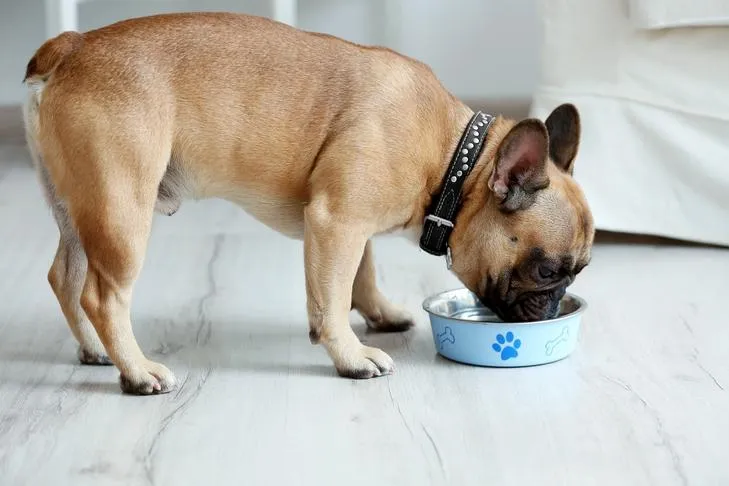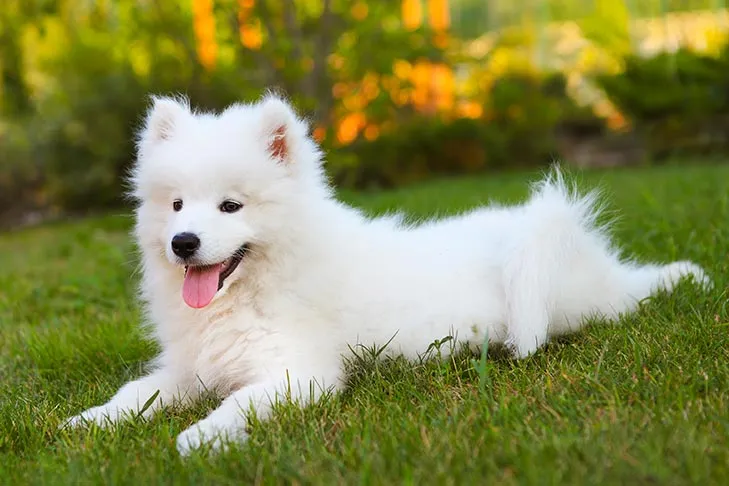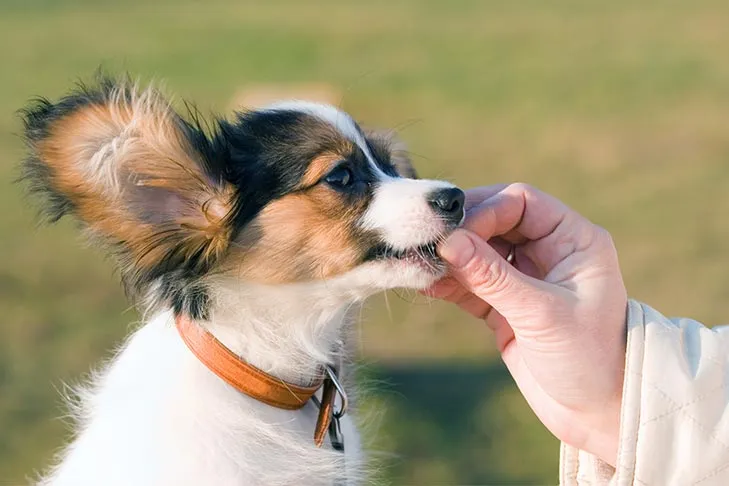Bringing a new puppy into your home is an exciting time, filled with joy, play, and a fair share of questions – especially concerning their diet. Just like human babies, puppies have unique nutritional needs that differ significantly from adult dogs. Understanding what they can and cannot eat is crucial for their healthy development, preventing digestive upset, and avoiding potentially toxic situations. This guide, tailored specifically for new puppy parents, will walk you through safe human foods that can be offered in moderation, highlight common ingredients found in quality puppy food, and, most importantly, list the foods that are strictly off-limits to ensure your furry friend thrives. Navigating the world of puppy nutrition can be complex, but with the right knowledge, you can provide a diet that supports their growth and well-being. Discover what food can a Maltese dog eat and apply similar principles for healthy puppy feeding.
Safe Human Foods for Growing Puppies (In Moderation)
While the bulk of a puppy’s diet should consist of high-quality commercial puppy food, offering small, appropriate portions of certain human foods can be a delightful and nutritious treat. Always introduce new foods slowly and in very small quantities to monitor for any adverse reactions, as puppies can have sensitive digestive systems.
1. Bread (Plain and Unseasoned)
Small amounts of plain, unseasoned bread are generally safe for puppies, provided it contains no spices, artificial sweeteners, or harmful ingredients like raisins. However, it offers minimal nutritional benefits and can contribute to excess carbohydrate and calorie intake. Opt for homemade bread without preservatives if you choose to offer it, but it’s best kept to a rare treat.
2. Cashews (Unsalted and in Small Quantities)
Cashews can be given to puppies sparingly. They contain beneficial nutrients like calcium, magnesium, antioxidants, and protein. Due to their fat content, even though lower than some other nuts, overfeeding can lead to weight gain and digestive upset in sensitive puppies. Ensure they are unsalted to avoid excessive sodium intake.
3. Cheese (Low-Fat Varieties)
Most puppies can enjoy small to moderate amounts of cheese as a treat, provided they are not lactose intolerant. Lactose intolerance is less common in puppies than some might assume, but always observe your puppy after offering dairy. Lower-fat varieties like cottage cheese or mozzarella are preferable to high-fat options. Some specific dog chews, like Himalayan dog chews made from dried cheese, are also popular and safe for puppies, offering a long-lasting treat.
 An American Dog puppy rests its head on a kitchen table, looking curiously at a small piece of cheese.
An American Dog puppy rests its head on a kitchen table, looking curiously at a small piece of cheese.
4. Coconut (Flesh, Milk, and Oil)
Coconut offers lauric acid, known for its antibacterial and antiviral properties. It can also help with bad breath and skin conditions such as hot spots, flea allergies, and itchy skin. Coconut milk and coconut oil are safe for puppies in small amounts. Always remove the fibrous outer shell, as it can be a choking hazard or cause intestinal blockage.
5. Corn (Off the Cob)
Corn is a common ingredient in many commercial dog foods and is safe for puppies when properly prepared. However, the cob itself is indigestible and can cause an intestinal obstruction, which is particularly dangerous for smaller puppies. If sharing corn, always ensure it is removed entirely from the cob. A squeaky corn toy might be a safer alternative for their chewing needs!
6. Eggs (Fully Cooked)
Fully cooked eggs are an excellent source of protein and can be a beneficial addition to a puppy’s diet, especially if they have an upset stomach. It is crucial that eggs are cooked thoroughly, as raw egg whites contain avidin, an enzyme that can interfere with biotin absorption, potentially leading to biotin deficiency over time.
7. Fish (Cooked and Boneless)
Fish, particularly salmon and sardines, provides healthy fats and amino acids, boosting a puppy’s overall health. Salmon is rich in vitamins and protein, while sardines offer easily digestible bones for extra calcium. For all fish except sardines, meticulous bone removal is essential to prevent choking or internal injury. Never feed raw or undercooked fish, as it can contain parasites harmful to puppies. Limit fish intake to once or twice a week.
8. Ham (In Very Small, Occasional Portions)
Ham is technically safe for puppies but is not a healthy regular food choice. Its high sodium and fat content can be problematic for a puppy’s developing digestive and renal systems. A very small, lean, unseasoned piece as an infrequent treat is acceptable, but it should never become a habit.
 A French Bulldog puppy is seen eating intently from a feeding bowl in a home environment.
A French Bulldog puppy is seen eating intently from a feeding bowl in a home environment.
9. Honey (In Small Amounts)
Honey is a nutrient-dense food, containing vitamin A, potassium, calcium, magnesium, copper, and antioxidants. Small amounts of local honey can potentially help puppies build immunity to environmental allergens by introducing trace amounts of pollen. Topically, honey can also be used to treat minor burns and superficial cuts. However, due to its sugar content, moderation is key.
10. Milk (With Caution for Lactose Intolerance)
While puppies consume their mother’s milk, some may develop lactose intolerance as they age and their digestive systems mature, making cow’s milk difficult to digest. Small quantities might be fine for some puppies, but owners should be vigilant for symptoms of lactose intolerance like diarrhea or gas. Water is always the best and safest hydrating option.
11. Peanut Butter (Raw, Unsalted, Xylitol-Free)
Peanut butter can be a great source of protein, heart-healthy fats, vitamins B and E, and niacin for puppies. The healthiest option is raw, unsalted peanut butter. Crucially, always check the label for xylitol, a sugar substitute that is highly toxic to dogs and can be fatal, even in small amounts.
12. Peanuts (Unsalted and in Moderation)
Unlike almonds, plain peanuts are safe for puppies and provide beneficial fats and proteins. However, due to their fat content, they should be given in moderation to prevent pancreatic issues. Always choose unsalted peanuts, as excessive salt is difficult for a puppy’s kidneys to process.
13. Popcorn (Plain, Air-Popped, Unbuttered, Unsalted)
Unsalted, unbuttered, air-popped popcorn can be an occasional treat for puppies. It contains riboflavin and thiamine, which support eye health and digestion, along with small amounts of iron and protein. Ensure all kernels are fully popped to avoid choking hazards or digestive issues from unpopped kernels.
14. Pork (Cooked, Lean, Unseasoned)
Pork is a highly digestible protein rich in amino acids. While it contains more calories per pound than some other meats, it can be a good option for puppies, especially those with sensitivities to other proteins. Always ensure it’s fully cooked, lean, and free of excessive fat, salt, or seasonings like onions and garlic, which are toxic.
 A fluffy Samoyed puppy lays comfortably in a field of green grass outdoors, enjoying the natural environment.
A fluffy Samoyed puppy lays comfortably in a field of green grass outdoors, enjoying the natural environment.
15. Quinoa (Cooked)
Quinoa is increasingly found in high-quality dry puppy and dog foods due to its impressive nutritional profile. It serves as a healthy alternative to common starches like corn, wheat, and soy, offering a complete protein source, fiber, and various minerals. Ensure it is cooked thoroughly before offering.
16. Salmon (Fully Cooked, Boneless)
As noted, fully cooked salmon is an excellent source of protein, healthy fats, and amino acids, promoting joint, brain, and immune system health in puppies. The danger lies in raw or undercooked salmon, which can harbor parasites leading to severe illness, including vomiting, diarrhea, dehydration, and potentially death. Proper cooking eliminates these parasites.
17. Shrimp (Cooked, Peeled, and Cleaned)
A few cooked shrimp, completely shelled (including tail, head, and legs), can be a healthy snack for puppies. Shrimp are low in fat, calories, and carbohydrates, yet high in antioxidants, vitamin B-12, and phosphorus. Always ensure they are thoroughly cooked.
18. Tuna (Cooked Fresh, or Canned in Water, Unseasoned)
Cooked, fresh tuna in moderation is a good source of omega-3 fatty acids, beneficial for heart and eye health. Canned tuna (packed in water, not oil, and unseasoned) can also be given in very small amounts, keeping in mind its mercury and sodium content. Large quantities of canned tuna should be avoided.
19. Turkey (Cooked, Lean, Boneless, Unseasoned)
Cooked turkey is safe for puppies, but it’s vital to remove all excess fat, skin, and especially bones. Poultry bones can splinter easily, causing blockages or tears in a puppy’s delicate digestive tract. Avoid any turkey prepared with excessive salt, seasonings, onions, or garlic.
20. Wheat or Grains (Unless Allergic)
Contrary to some popular beliefs, most puppies do not need a grain-free diet. Grains like wheat and corn are excellent sources of protein, essential fatty acids, and fiber. However, if your puppy has a diagnosed grain allergy, your veterinarian will recommend avoiding them. Always consult your vet for dietary recommendations tailored to your puppy’s specific needs.
21. Yogurt (Plain, Unsweetened, Xylitol-Free)
Plain, unsweetened yogurt can be an acceptable snack for puppies, especially those that can digest dairy well. The active bacteria in yogurt provide probiotics that can support a healthy digestive system. Avoid any yogurts with added sugars, artificial sweeteners, and especially xylitol.
 A small Papillon puppy delicately takes a treat from a human hand, showcasing gentle interaction.
A small Papillon puppy delicately takes a treat from a human hand, showcasing gentle interaction.
Human Foods Puppies Cannot Eat: The Dangerous List
It is paramount for every puppy owner to know which human foods are toxic and dangerous, as some can lead to severe illness, organ damage, or even death. Always keep these foods completely out of reach of your puppy, and immediately contact your veterinarian or an emergency animal hospital if you suspect your puppy has ingested any toxic substance.
1. Alcohol
Even small amounts of alcohol can cause significant intoxication in puppies, leading to vomiting, diarrhea, tremors, difficulty breathing, central nervous system depression, and even death. Keep all alcoholic beverages and food products containing alcohol strictly away from your puppy.
2. Avocado
Avocado contains persin, a fungicidal toxin. While varying in concentration, it can cause vomiting and diarrhea in some puppies. It’s best to avoid giving avocado to puppies.
3. Chocolate, Coffee, and Caffeine
These contain methylxanthines (theobromine and caffeine) which are toxic to puppies. Dark chocolate and baking chocolate are the most dangerous. Ingestion can cause vomiting, diarrhea, panting, excessive thirst, hyperactivity, abnormal heart rhythm, tremors, seizures, and even death.
4. Citrus (Stems, Leaves, Peels, Fruit)
The stems, leaves, peels, and seeds of citrus fruits contain citric acid and essential oils that can cause digestive upset in puppies. While the fruit pulp itself isn’t highly toxic, it’s generally best to avoid feeding citrus to puppies.
5. Coconut Shells
While coconut flesh, milk, and oil are generally safe, the hard, fibrous outer shell of a coconut is a choking hazard and can cause internal blockages if ingested.
6. Grapes and Raisins
These fruits are highly toxic to dogs and puppies, even in small amounts. They can cause sudden kidney failure. The exact toxic substance is unknown, but the consequences can be fatal. Never give grapes or raisins to your puppy.
7. Macadamia Nuts
Macadamia nuts can cause weakness, tremors, vomiting, fever, and central nervous system depression in dogs. While usually not fatal, these symptoms can be very distressing for a puppy.
8. Onions, Garlic, Chives, and Leeks
These alliums contain compounds that can damage a puppy’s red blood cells, leading to anemia. Garlic is considered more potent than onions. Symptoms may include vomiting, diarrhea, weakness, and loss of appetite. Cooked or raw, these should be avoided.
9. Xylitol (Artificial Sweetener)
Xylitol is a sugar substitute found in many sugar-free products like gum, candies, baked goods, toothpaste, and some peanut butters. It is extremely toxic to dogs and puppies, causing a rapid release of insulin that leads to a sudden and dangerous drop in blood sugar (hypoglycemia), liver failure, and seizures. Ingestion can be fatal. Always check labels for xylitol.
10. Yeast Dough
Raw yeast dough can be dangerous for puppies. The yeast ferments in the warm, moist environment of the stomach, producing alcohol (which is toxic) and expanding, leading to painful bloating and potentially a life-threatening condition called gastric dilatation-volvulus (GDV) or bloat.
11. Bones (Cooked)
While raw bones can sometimes be given with caution and under supervision to adult dogs, cooked bones are brittle and can splinter easily. These splinters can cause choking, internal punctures, or obstructions in a puppy’s digestive tract. It’s always safer to opt for veterinarian-approved chew toys.
12. Uncooked/Undercooked Meat, Eggs, and Fish
Raw or undercooked animal products can harbor dangerous bacteria like Salmonella, E. coli, and Listeria, as well as parasites. These can cause severe gastrointestinal illness in puppies and can also pose a risk to human family members. Always cook meats, eggs, and fish thoroughly.
13. High-Fat Foods
Excessively fatty foods, like bacon grease, fried foods, or fatty trimmings, can lead to pancreatitis in puppies. Pancreatitis is a painful and potentially serious inflammation of the pancreas, which is particularly dangerous for young dogs.
14. Salt and Salty Snacks
Large amounts of salt can cause sodium ion poisoning in puppies. Symptoms include vomiting, diarrhea, tremors, elevated body temperature, seizures, and even death. Avoid giving salty snacks like pretzels, chips, and excessive table scraps.
15. Milk and Dairy Products (If Lactose Intolerant)
While some puppies tolerate small amounts of dairy, many can be lactose intolerant, leading to digestive upset, diarrhea, and gas. Monitor your puppy closely if offering dairy and discontinue if any adverse symptoms appear.
Knowing a list of what dogs can’t eat is fundamental for puppy safety. Further, understanding what are foods dogs can’t have helps prevent accidental poisonings. Always remember what foods can you not feed your dog and prioritize their health. It is critical to be aware of what foods should you not feed your dog to maintain their well-being.
Conclusion
Providing your puppy with a healthy and safe diet is one of the most important responsibilities of a pet parent. While their primary nutrition should come from a high-quality puppy-specific dog food, understanding which human foods are safe and which are strictly off-limits can enhance their diet with occasional treats and prevent dangerous situations. Always introduce new foods cautiously, in very small quantities, and be vigilant for any signs of digestive upset or allergic reactions. When in doubt, it’s always best to err on the side of caution and consult your veterinarian. They can provide personalized dietary advice based on your puppy’s breed, size, age, and individual health needs. Prioritizing your puppy’s nutritional safety and well-being will contribute to a long, happy, and healthy life together. For more insights into canine nutrition and care, explore our other articles on Dog Care Story.
